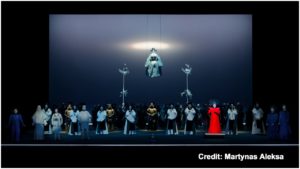
Lithuanian National Opera 2018–19 Review: Turandot
Robert Wilson Gives A Masterclass In Directing Puccini’s Final Opus
By Polina LyapustinaThe most important thing in the opera, according to Robert Wilson, is the last second. And this sounds really convincing. But is this enough? Is the last second enough to win the audience’s hearts when you’re about to present your new and very distinctive production of Puccini’s classic at an opera house that is not as advanced, as it happened last weekend with Wilson’s “Turandot” at the Lithuanian National Opera?
No one took for granted that there might be some challenges with mounting this version of Puccini’s last opera in Vilnius. The National Opera set up a number of lectures and meetings to allow interaction between audiences and creators in anticipation of the opening night. But even with sold tickets months before, there was still a tension in the air heading into the premiere. At least the members of the audience had an opportunity to prepare.
The Main Line
Robert Wilson is not a person to adapt his work to someone’s expectations and has a proper understanding of what theatre performance is. The most important thing for him is a single line, from the first moment to the brilliant last second. And this is what Turandot is.
By Turandot, I mean the princess herself. Whether the director liked the title character or not, she was the only one, for whose sake this performance was built. And he used all his signature elements: light, color and movements to show us his own perspective of her.
The color was Turandot. Red is for the princess, and it couldn’t be any other heroine of any other opera. The other colors were recognizable from other Wilson productions, but red is not one that is often a part of his palette. The light separated Turandot from others.It was strong, powerful, and eternal. She had her own radiance, her blinding red dress reflected the light with extra power.
Whereas Calaf, Liu, and Timur were in white (this color clearly connected them), it also emphasized that the director himself didn’t think of Calaf as being all that unique or even intelligent, given that he is supposed to be “mysterious.” The other characters were just dark. And this darkness has a very impressive power of motion; they were like shadows that repeated the movements of the main characters, giving them more weight.
Speaking of movement, everyone moved, but the princess. This stillness was her force, which set her apart from others, which gave her voice an extra power.
After the initial premiere at Teatro Real de Madrid, some said that there was not enough physical communication. I can’t agree. Just think about Liu’s death scene. The young slave never stabbed herself, but instead slowly moved toward the princess, approaching her heart slowly. At the last second, she hit Turandot and left the stage. This was a moment where the emotions were potent, causing a physical interaction.
Dealing With the Ending
Some emotional scenes didn’t cause anything. For example, nothing happened at the end of the opera. Turandot doesn’t end up in Calaf’s arms as the opera draws to a close. It seems that the director was not convinced by the dramatic denouement of the work and he seemingly made no attempt to create it.
I find this moment the weakest musically (this production included Franco Alfano’s ending), but it was the most interesting from a directorial standpoint. Calaf did kiss Turandot and she seemingly felt that she had to give up. But once she knows his name, we see her restored to the powerful, greedy, and lonely woman of the opera’s beginning. Calaf’s light dimmed and he moved to the crowd behind. There was pride, power, and arrogance on her face. She won. Yes, she sang about love, but the actions onstage definitely didn’t express love; they expressed HER happiness. She remained herself. “I can’t rewrite Puccini,” Wilson said. And he didn’t, he just showed it in a way he believed.
The Voices
The Lithuanian National Opera gave Wilson its best singers.
Soprano Sandra Janušaitė performed the title role, dramatic tenor Kristian Benedikt could finally reveal his round and silky timbre as Calaf, and young soprano Eugenia Dushina challenged herself with Liù’s “Signore, Ascolta!”
I initially thought Eugenia Dushina was perfect for this role in Wilson’s production. “One day at the palace you smiled at me…” featured sincere and gentle voice, but she lost some of that tenderness in “Signore, Ascolta!”. While her technique was precise, and she easily kept her voice high, the sincerity disappeared. However, when she had to stand up for her love and triumph over Turandot, she managed to be extraordinarily convincing. She masterly operated her beautiful lyric instrument and brought a powerful acting performance.
The vocal interpretation of the title character was as controversial as the princess herself. Even though Sandra Janušaitė is one of the finest sopranos in Lithuania, her powerful voice simply lacks depth of color to fill this role. Her high notes were clean, but seemed more likely hysterical, which didn’t suit the cold “daughter of heaven.” This was most present in the aria “In questa reggia,” where there was a lack of variety in the singing, all the lines similar in direction to one another. But in the third act, she finally reached her climax both emotionally and vocally. Standing on stage alongside her partner, Sandra Janušaitė was the only one you could hear and see. She triumphed. And as Robert Wilson said: “If you set the last second right, they will forgive you for everything you’ve done all night.” So we did.
The one who turned his role into something bigger was that night’s Calaf. Kristian Benedikt brought a great variety of emotions to his interpretation of “the hero of one aria.” Even though he struggled with volume issues at the start of the opera, his voice seemed perfectly aligned with the narrative. He took his aria “Non piangere, Liu” by storm, reaching the intense volume and covering a wide range with high extremes effortlessly. His tender farewell to the young slave showed another side of his voice: deep, with much lyric warmth to his dramatic tone. And as for “Nessun dorma,” it was far from his most exciting or enticing moment. Though Puccini’s top B went very well, this aria wasn’t the center of that performance. As it was never meant to be.
Scene Stealers
The most affecting change in Robert Wilson’s “Turandot” was Ping, Pang, and Pong, the old henchmen of the cruel princess who were turned into the most amazing and unreal creatures on stage. Young singers Juan Antonio Sanabria, Vicenç Esteve, and Steponas Zonys were jumping, screaming, grimacing, and bring the most controversial emotions to this performance.
Dressed pretty much the same (nothing like yellow, red, green), they moved differently, representing extremely different personalities and supplementing each other. From their first appearance, their movements and style evoked another trio in my mind — Lock, Shock, and Barrel from the iconic “Nightmare before Christmas.” The audience loved them very much and gave them the loudest applause at the curtain call.
Great Support
The chorus exceeded expectations and satisfied everyone. Chorus master Česlovas Radžiūnas made it sound perfect: powerful and melodic. They seemed to reflect every emotion on stage on a universe scale. Visually, Wilson gave chorus members the opportunity to show their “faces” and as they started the “Pietà di lui!” part at the beginning of the first act, the attention was partially moved from one person in the crowd to another.
The orchestra also displayed impressive musicianship under the baton of Modestas Pitrėnas, who through slower tempi, gave a sensitive and subtle performance with lovely melodic phrasing. He also allowed the sound to be bright and heavy, giving the opera remarkable texture and color. He displayed a perfect musical balance that helped Wilson make his modified characters more convincing. It also allowed the singers to hold their consuming vocal lines with greater ease.
Mankind will never leave their expectations. This was and always will be our nature. But maybe opera as an art form and entertainment now has its own expectations of its audience. And maybe it is time for us, opera lovers, to find a new way to think about this art form that we love. By getting to know more, by understanding contexts and motives on a deeper level, we may just be able to allow opera to surprise more than we could imagine.
Otherwise, we risk missing out on a masterpiece. Something better than just Puccini’s “Turandot.”



